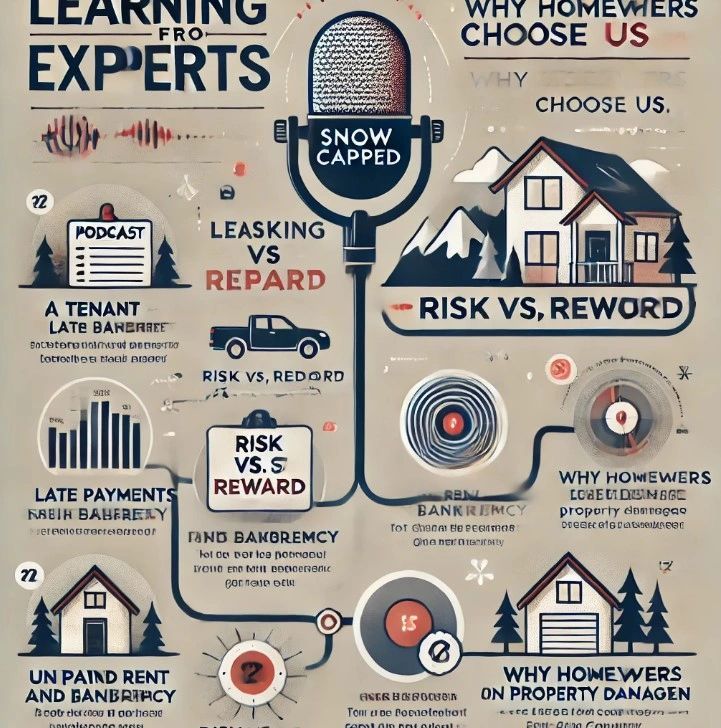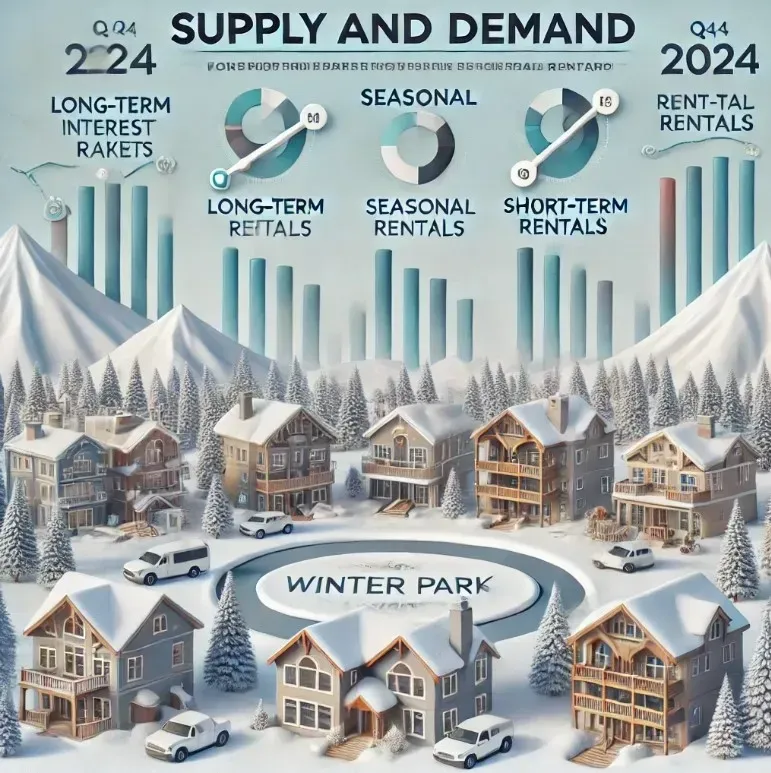STR Fees Increase as More Convert to Long Term Rentals
Charles Phanumphai • January 13, 2025
Why More Cities in Grand County Are Adding STR Pressure—And Why Homeowners Are Shifting to Long-Term Rentals
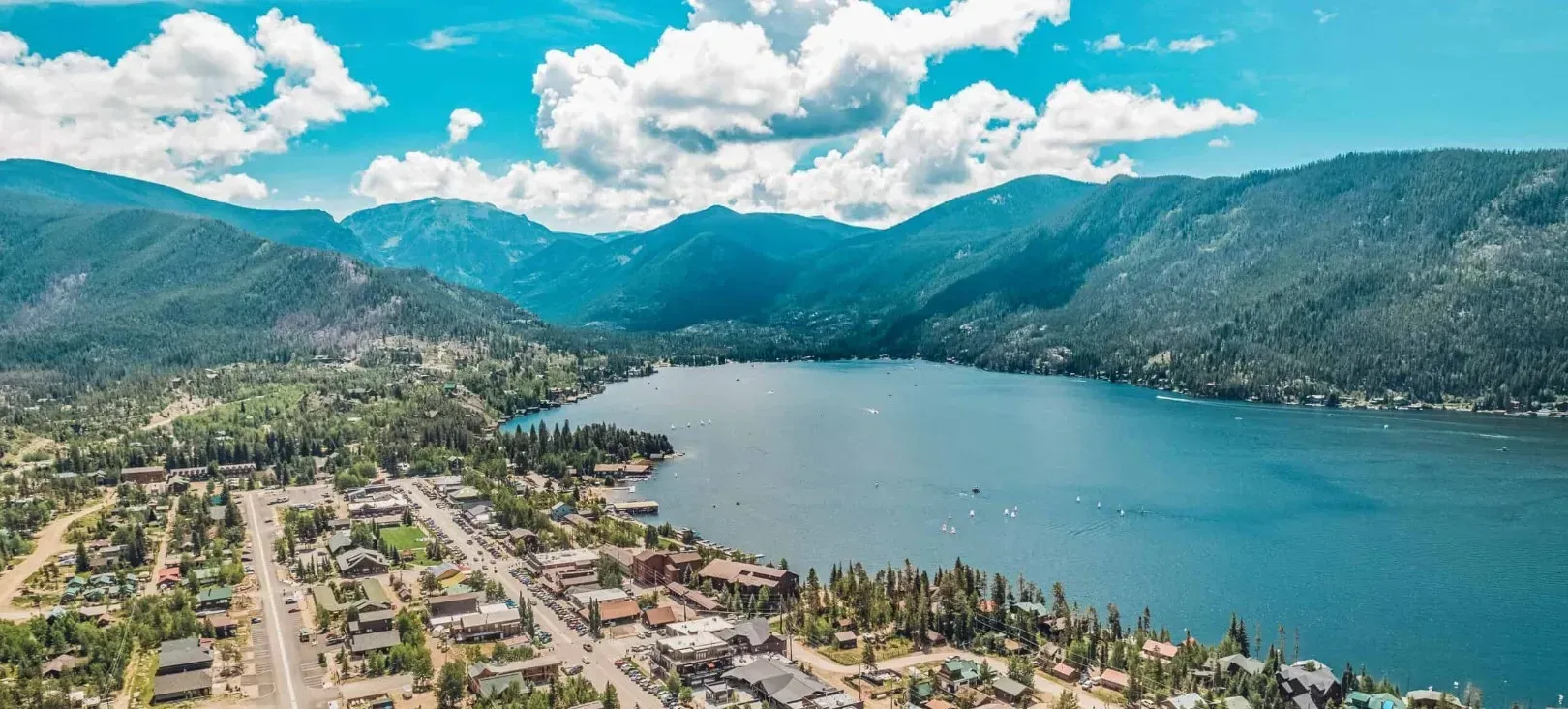
In recent years, cities and towns across Grand County, Colorado, have increased pressure and costs on short-term rental (STR) homeowners and operators. This trend reflects a broader effort to manage the impact of STRs on communities while addressing housing affordability issues. One recent example is the Grand Lake Board of Trustees’ decision to raise fees and deposits for various licenses, including nightly rental licenses, starting in 2025.
Fee Increases in Grand Lake
The new fee structure for nightly rental licenses in Grand Lake represents a significant cost hike for STR operators. While the one-time application fee remains unchanged at $165, the annual license fees have increased considerably. Here’s a breakdown of the updated fees based on occupancy levels:
1-3 Occupancy: $700 per license
4-6 Occupancy: $900 per license
7-10 Occupancy: $1,100 per license (a 22% increase from $900 in 2024)
11+ Occupancy: $2,000 per license (a newly added tier)
These fees must be paid annually to renew a nightly rental license and maintain compliance with local regulations. According to Grand Lake Treasurer Heike Fawkes, revenue from these fees funds the town’s general operations, attainable housing initiatives, program advertising, code enforcement, and other administrative costs. In 2024, the town collected approximately $84,000 from nightly rental licenses, and that figure is expected to rise in 2025 due to the fee increases.
Why Are Fees Increasing?
Under municipal codes, towns like Grand Lake have the authority to update fees to offset the direct and indirect costs of administering STR programs and mitigating their impacts on the community. These impacts include:
Strain on Housing Availability: STRs often reduce the availability of long-term rentals, contributing to a housing shortage for residents.
Community Concerns: Increased tourist activity can lead to noise complaints, parking issues, and other disruptions.
Administrative Costs: Running STR licensing programs requires funding for advertising, enforcement, and compliance monitoring.
The Shift Toward Long-Term Rentals
As STR costs rise, many homeowners who are barely covering their expenses are reevaluating their options. Here’s why more homeowners are making the shift to longer-term or seasonal rentals:
Rising Costs and Complexity: Higher fees, stricter regulations, and increased administrative burdens make STRs less financially appealing.
Stable Income: Long-term rentals provide a consistent income stream without the seasonal fluctuations of STRs.
Reduced Oversight: Managing a long-term rental typically requires less oversight and fewer resources compared to the constant turnover and upkeep of STRs.
Community Impact: Some homeowners are motivated to contribute to local housing solutions, offering their properties to residents rather than tourists.
Many of these homeowners are turning to Snow Capped Properties to manage their long-term rentals. As one of the largest—if not the largest—long-term rental companies in the Winter Park to Grand Lake area, Snow Capped Properties manages over 75 properties and is continuing to grow. Their expertise and local presence make them a go-to partner for property owners navigating the transition to long-term rentals.
Conclusion
For STR homeowners in Grand County, the financial and operational challenges of maintaining a nightly rental license are growing. As cities like Grand Lake continue to implement fee increases and other regulatory measures, many property owners are finding that transitioning to long-term rentals offers a more sustainable and community-focused alternative.
Whether driven by economic necessity or a desire to address housing needs, this shift highlights a critical moment for Grand County’s rental market. Homeowners navigating these changes should carefully evaluate their options to ensure their properties remain both profitable and aligned with community priorities.
Share
Tweet
Share
Mail
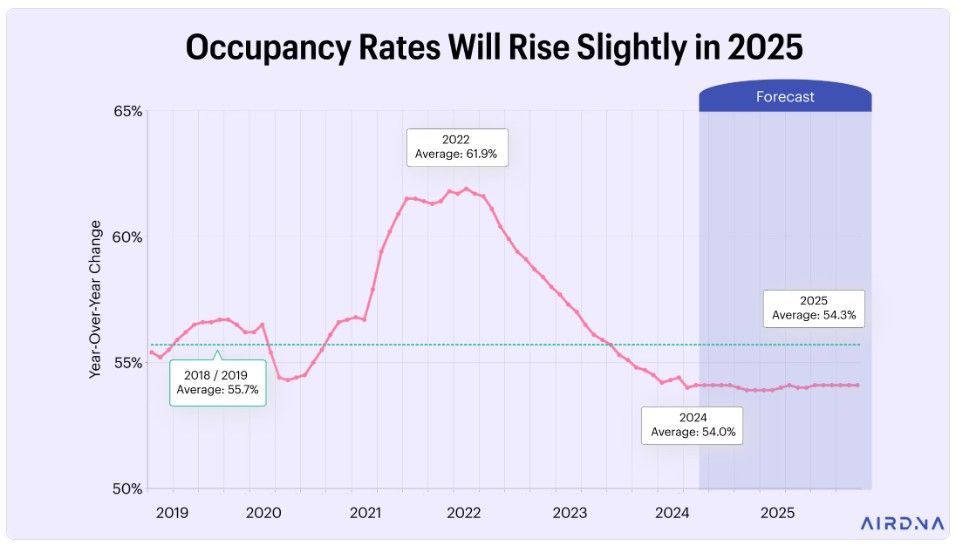
By Charles Phanumphai
•
April 2, 2025
Grand County has long been a hotspot for short-term rentals (STRs), attracting visitors looking for a cozy mountain getaway. However, in recent months, a noticeable shift has begun—many homeowners, particularly those with smaller two-bedroom condos, are opting out of the STR market in favor of longer-term rentals (LTRs). Why the Shift? The primary drivers behind this trend stem from a combination of low occupancy rates, rising STR permit costs, and tightening regulations. With stricter local ordinances and increased taxes, many homeowners are finding that short-term renting is no longer as lucrative or hassle-free as it once was. When combined with an oversaturated STR market, lower-than-expected booking rates, and seasonal fluctuations, the financial appeal of STRs is diminishing. What Does This Mean for the Rental Market? As more properties transition into long-term rentals, the market is experiencing a surge in available units, particularly smaller condos. This influx is already having noticeable effects: Increased Supply Leading to Slightly Lower Rental Rates With more long-term rental options available, the average rental price has begun to decrease slightly, particularly for smaller units. While this benefits tenants who have long struggled with affordability in Grand County, it also means that homeowners may need to adjust their pricing expectations to remain competitive. Homeowners Struggle to Secure Tenants and Consider Selling While lower rental rates benefit tenants, they may pose challenges for homeowners who rely on higher rental income to cover mortgage and HOA fees. If landlords struggle to find qualified tenants at sustainable rates, some may opt to sell instead. This could lead to an increase in real estate inventory, impacting home prices. A Potential Shift in Home Prices The impact on home prices will depend on multiple factors, but if a substantial number of STR homeowners offload their properties, this could increase housing supply and potentially drive prices down. Additionally, with economic uncertainties such as layoffs, rising unemployment, and potential foreclosures on the horizon, these factors could further cool the housing market in Grand County. What Should Homeowners and Renters Expect? For homeowners contemplating their next move, adapting to market conditions is key. If renting is the goal, competitive pricing and tenant screening will be crucial to securing long-term occupancy. For those considering selling, understanding local market trends and buyer demand will help in making informed decisions. For tenants, the potential increase in rental availability could open up new housing opportunities at more affordable rates. However, rental market shifts can happen quickly, so prospective renters should stay informed and act when the right opportunity arises. The Bigger Picture This shift in the STR market is part of a broader conversation about the sustainability of short-term rentals versus long-term housing solutions. While STRs have provided income for many homeowners, they have also contributed to housing shortages for local workers and residents. As more properties re-enter the long-term rental market, Grand County may see a rebalancing that benefits both renters and the local economy. Final Thoughts Whether you are a homeowner, renter, investor, or real estate professional, staying ahead of these market shifts is crucial. The coming months will reveal whether the rental market stabilizes with lower rates or if a wave of home sales triggers a broader price adjustment. Either way, Grand County’s real estate landscape is undergoing a transformation that will shape the future of housing in the area. If you're a homeowner looking for guidance on transitioning to long-term rental or selling your property, Snow Capped Properties is here to help. Reach out today for expert insights and strategies tailored to the evolving market.
By Charles Phanumphai
•
February 27, 2025
Dear Snow Capped Homeowners and Tenants, We are excited to share some great news with you—Snow Capped Properties is growing! As of February 24, 2025, we have welcomed Kim to our team to help support our expanding portfolio. With 83 doors currently under management and a goal of reaching 120, we remain committed to maintaining the high-quality service and personal care you’ve come to expect from us. Kim is a Grand County native with a diverse background that makes her a fantastic addition to our team. In addition to her experience in property services, she brings skills in locksmithing, private investigations, and co-ownership of a local tile and stone company. She has also been deeply involved in the community, serving as the Past President of the local Chamber of Commerce. Beyond her professional expertise, Kim enjoys home life at Lake John with her husband, grandkids, chickens, and bees. She has a passion for gardening and crafting, which speaks to her hands-on, detail-oriented nature—qualities that will serve our homeowners and tenants well. We are excited for you to meet Kim and experience the continued dedication to service that Snow Capped Properties is known for. Thank you for being a valued part of our community—we look forward to growing together!

By Charles Phanumphai
•
February 25, 2025
At Snow Capped Properties, we are always looking for ways to better serve our homeowners and tenants. That’s why we are thrilled to announce that we have expanded our property management services to include Hot Sulphur Springs! As a charming, historic town nestled in Grand County, Hot Sulphur Springs offers an incredible opportunity for long-term rentals at more affordable pricing compared to its neighboring towns. Why Hot Sulphur Springs? Hot Sulphur Springs is a hidden gem for those seeking a peaceful, small-town atmosphere while remaining close to the outdoor recreation and employment opportunities that Grand County has to offer. With its historic hot springs, stunning natural beauty, and strong sense of community, this town is an attractive option for renters looking for a place to call home year-round. For tenants, this expansion means access to quality, long-term rental options at competitive prices. Compared to Winter Park, Fraser, and Granby, Hot Sulphur Springs offers more affordability while still being within easy commuting distance to ski resorts, national parks, and other major employment centers in the area. Benefits for Homeowners If you own a property in Hot Sulphur Springs and have considered renting it out, now is the perfect time to do so! With our professional property management services, we handle everything from tenant screening and lease agreements to maintenance and rent collection, making the process hassle-free for homeowners. With lower home prices and steady rental demand, Hot Sulphur Springs is an excellent market for property owners looking to generate consistent rental income without the high costs associated with short-term rentals. A Growing Community with Long-Term Potential Hot Sulphur Springs is not just an affordable option—it’s also a growing community with long-term potential. As more people seek alternatives to the high costs of living in larger mountain towns, the demand for well-managed, long-term rental properties in Hot Sulphur Springs continues to rise. Snow Capped Properties is excited to be at the forefront of this growth, offering professional management services that benefit both tenants and homeowners alike. Partner with Snow Capped Properties Our expansion into Hot Sulphur Springs aligns with our mission to provide exceptional property management services across Grand County. Whether you’re a homeowner looking to rent out your property or a tenant searching for a great place to live, we’re here to help. If you’re interested in learning more about rental opportunities in Hot Sulphur Springs or how we can help manage your property, reach out to Snow Capped Properties today! Let’s work together to make Hot Sulphur Springs the next great community for long-term renters and homeowners alike!
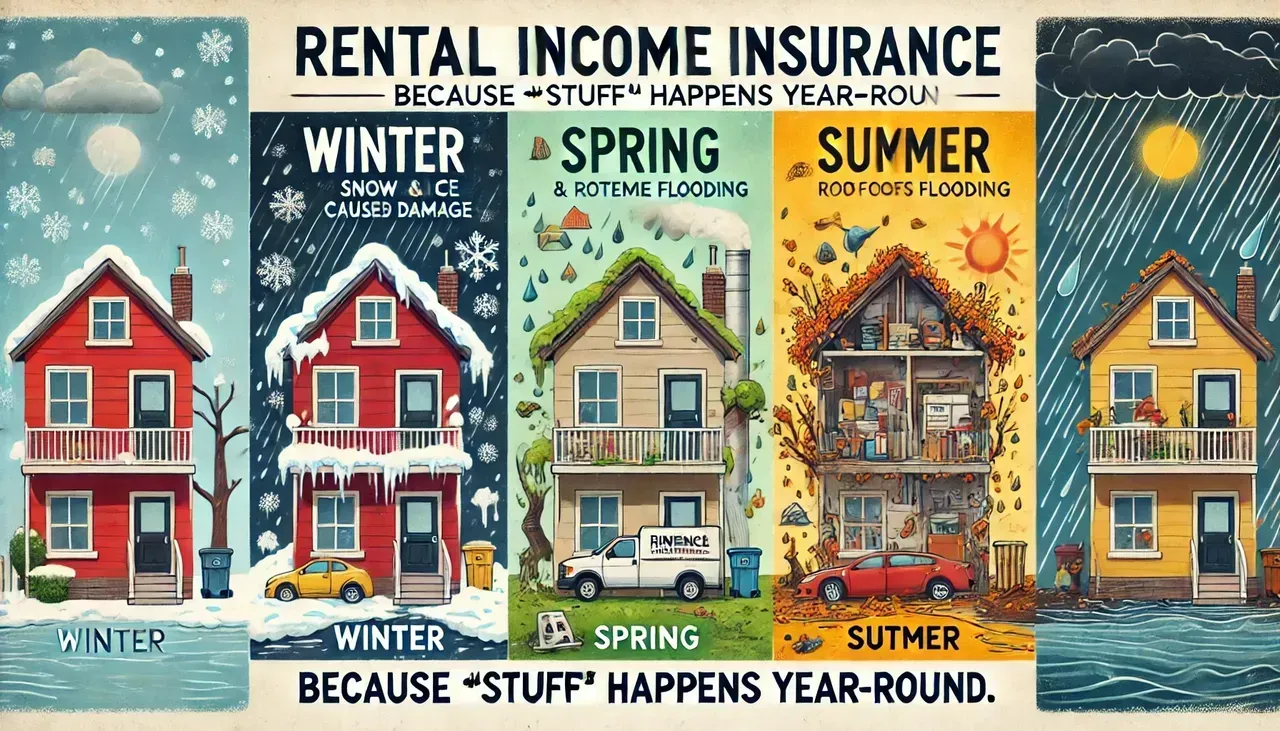
By Charles Phanumphai
•
January 21, 2025
As a property investor, you know the ups and downs of rental ownership. One season, you’re collecting rent checks with ease; the next, you're dealing with a burst pipe, a broken furnace, or unexpected vacancies. It's the nature of the business—no matter how carefully you plan, stuff happens. That’s where rental income insurance comes in. What is Rental Income Insurance? Rental income insurance is your safety net. It provides coverage for lost rental income when your property becomes uninhabitable due to covered damages, like a fire, storm, or other disasters. Simply put, it helps ensure you’re not left scrambling when life throws you (and your tenants) a curveball. Why Every Season Brings Risks No matter the time of year, there’s always the potential for unforeseen events that could disrupt your rental income: Winter Woes: Frozen pipes, ice dams, and furnace breakdowns can render your property unlivable—and costly to repair. Spring Surprises: Flooding from snowmelt or heavy rain can cause water damage and delay tenant move-ins. Summer Scenarios: HVAC failures in peak heat waves or storm-related roof damage can make your property temporarily uninhabitable. Fall Frustrations: Fallen leaves can clog gutters, leading to water damage, or early snowstorms can wreak havoc on your property’s exterior. Each season presents unique challenges, but with rental income insurance, you can weather the storm (literally and figuratively) without financial strain. Protect Your Bottom Line As a property investor, maintaining consistent cash flow is critical. Rental income insurance ensures that even if disaster strikes, your finances stay intact. This protection allows you to: Cover mortgage payments, Pay property taxes, Handle repairs without dipping into your savings By shielding your income from unexpected losses, you can focus on long-term growth without the stress of short-term setbacks. Peace of Mind for You and Your Tenants Investing in rental income insurance isn’t just about protecting your wallet; it’s about being a responsible property owner. With coverage in place, you can ensure timely repairs and minimize disruption for your tenants. Happy tenants lead to long-term leases and a stronger reputation as a landlord. The Bottom Line Whether it’s a freezing winter night or a scorching summer afternoon, stuff happens. Pipes burst, storms roll in, and tenants move out unexpectedly. As a savvy investor, having rental income insurance is your way of saying, “I’m ready for anything.” It’s not just protection—it’s peace of mind. So don’t wait for stuff to hit the fan (or the roof). Invest in rental income insurance today and safeguard your property—and your profits—year-round.

By Charles Phanumphai
•
January 12, 2025
Pricing Trends In contrast to Denver, Grand County is seeing a significant decline in median sale prices. Currently around $750,000, prices have dropped by 16.2% compared to last year. This cooling trend may attract buyers looking for more favorable pricing. (Source: Redfin) Inventory and Sales Activity Grand County has experienced a remarkable 71.9% year-over-year increase in the number of homes sold, with 98 transactions recorded in November 2024 compared to just 57 during the same period in 2023. However, the average days on market have risen slightly to 80 days, indicating that while sales are up, properties are taking longer to close. (Source: Redfin) Market Dynamics The combination of declining prices and increased sales activity reflects a market in transition. Sellers may need to adjust their pricing strategies to align with shifting buyer preferences and economic conditions. Comparative Insights Market Stability Denver stands out for its stability, with steady price appreciation and a growing inventory catering to a balanced real estate environment. In contrast, Grand County’s significant price drop suggests a less competitive market, potentially appealing to buyers seeking affordability. Buyer Opportunities Grand County’s cooling market offers greater opportunities for buyers to negotiate favorable deals. Meanwhile, Denver’s market, with its expanded inventory, provides diverse options but may have less room for price negotiation. Seller Considerations Sellers in Grand County should consider revising their pricing strategies to stay competitive in a declining market. On the other hand, Denver sellers can leverage the market’s stability to attract buyers while maintaining reasonable pricing expectations. Conclusion Both Denver and Grand County real estate markets reflect broader economic influences, such as rising mortgage rates and evolving buyer preferences. However, Denver’s market offers greater stability, making it a reliable option for buyers and sellers alike. Grand County, with its price declines, presents opportunities for buyers willing to navigate a cooling market. Understanding these dynamics can help both buyers and sellers make informed decisions as they navigate the real estate landscape in 2025.
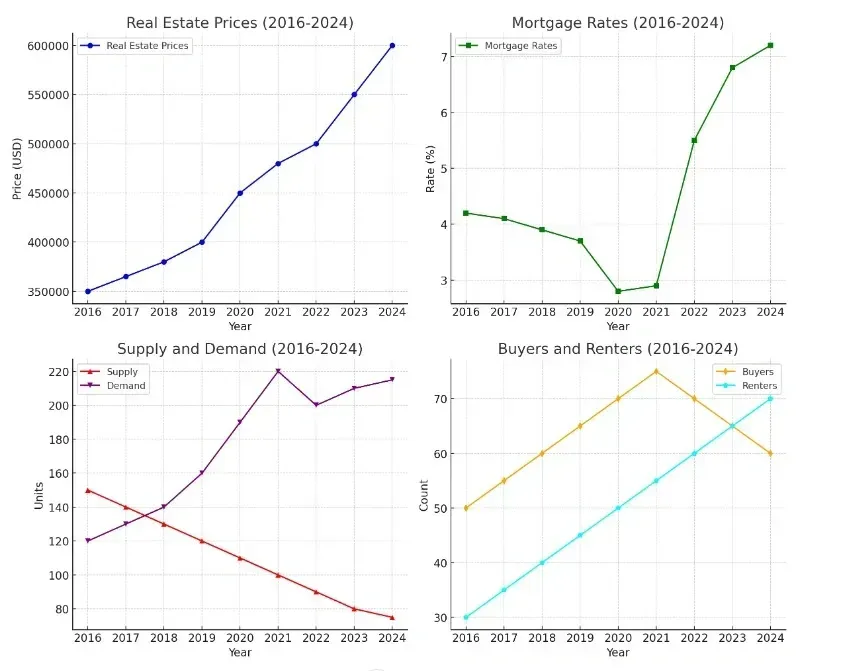
By Charles Phanumphai
•
November 16, 2024
With the results of the 2024 presidential election confirming Donald Trump’s return to the White House, the nation’s political and economic outlook has entered a new chapter. For Grand County, Colorado, a region already shaped by years of housing market shifts, this political change brings speculation about what the future may hold for real estate prices, mortgage rates, rent trends, and the supply-and-demand balance in the housing market. Here’s a look at how Grand County’s real estate market has evolved over recent years and what could be next. Real Estate Sales Prices: Continual Growth with Regional Nuances Home prices in Grand County have been on a steady upward trajectory for years, and this trend has only intensified with ongoing demand for mountain living. 2020-2024: Fueled by pandemic-driven relocations and sustained interest in second homes, property values surged. The median home price in Grand County increased by more than 50% compared to pre-pandemic levels. 2024 Outlook: Following the election, economic optimism among certain demographics may bolster demand, particularly for higher-end properties. However, affordability remains a concern for local buyers and workforce housing advocates. Mortgage Rates: A Critical Factor for Buyers Mortgage rates remain a key determinant of real estate activity. 2020-2023: Rates rose sharply due to Federal Reserve efforts to curb inflation, peaking at over 7% in mid-2023, which dampened buyer activity. Post-2024 Election: Speculation about the new administration's economic policies has created uncertainty. If policies favor deregulation and pro-business initiatives, rates could stabilize or even decrease slightly, reigniting buyer interest. However, any prolonged inflationary pressure could lead to further rate hikes. Rental Market: High Demand, Limited Supply Grand County’s rental market reflects broader housing challenges, with limited supply and increasing demand: Short-Term Rentals: The area remains a hotspot for vacationers, and short-term rentals (STRs) continue to dominate the market. However, tighter local regulations on STRs have nudged some properties back into the long-term rental pool. Long-Term Rentals: While more properties are becoming available for long-term tenants, rent prices remain elevated due to a shortage of workforce housing and high property values. The Winter 2024 season is expected to see another spike in rental demand from seasonal workers and skiers. Supply and Demand: A Persistent Imbalance The mismatch between housing supply and demand in Grand County has been a defining feature of its real estate market: Inventory Shortages: Limited new construction and high land costs continue to constrain housing supply. Strong Demand: The appeal of mountain living, combined with a growing remote workforce, keeps demand for homes high. Buyers and renters alike face stiff competition for properties. Election Influence: If the administration focuses on policies that encourage infrastructure development or tax incentives for housing, the supply bottleneck may ease. However, such changes take time to impact the market. What’s Next for Grand County Real Estate? While it’s too soon to predict the full impact of the 2024 election results on Grand County, the market is likely to remain dynamic and competitive in the near term. For Buyers: Opportunities may arise if mortgage rates stabilize or drop, but inventory challenges will persist. For Sellers: The current environment remains favorable for selling, especially for high-value properties. For Renters: Renters will need to act quickly to secure leases, particularly during peak seasonal periods. At Snow Capped Properties, we understand the complexities of the Grand County real estate market and are here to guide you through buying, selling, or renting. Our expertise in local trends and housing strategies ensures you stay ahead in this competitive market. Ready to explore your options? Contact us today!
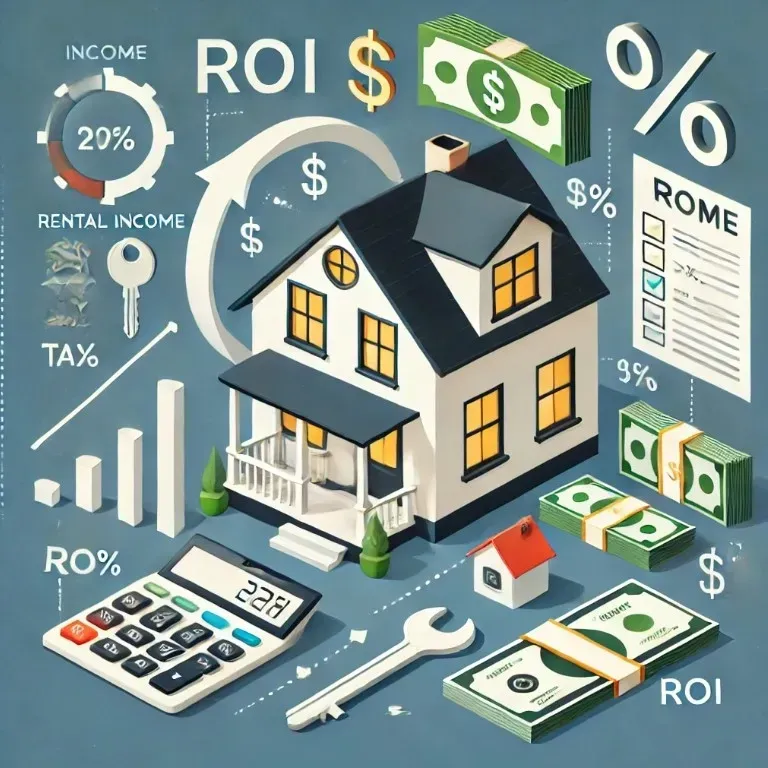
By Charles Phanumphai
•
October 29, 2024
Whether you're a new homeowner considering turning your vacation home into an income-producing rental, or an investor eager to purchase your first rental property, understanding how to calculate the return on investment (ROI) is critical to ensuring your property is profitable. Calculating ROI allows you to assess whether your rental will generate positive cash flow, helping you make an informed decision. What is ROI and Why is it Important? Return on investment (ROI) is a metric used to evaluate the profitability of an investment. In the context of rental properties, ROI helps you measure how much return you'll earn relative to the cost of acquiring and operating the property. Understanding your ROI ensures that you’re making smart financial decisions and helps you assess how much cash flow (profit) you’ll generate after covering all expenses. Key Metrics for Calculating ROI Here’s what you need to know to calculate your ROI on a rental property: 1. Purchase Price This is the cost you pay to acquire the property. It’s not just the listing price—you’ll also need to factor in closing costs, inspections, and any necessary repairs. 2. Down Payment Most lenders will require a down payment, typically 20-25%, on an investment property. This is important because it impacts your loan amount, and ultimately, your monthly mortgage payment. 3. Financing Terms Understand the terms of your mortgage: the interest rate, length of the loan (15 or 30 years), and whether it’s a fixed or variable rate. Your loan terms will impact the size of your mortgage payments, which will affect your cash flow. 4. Operating Expenses Operating expenses include the recurring costs associated with running the rental. These typically include: - Property Taxes - Insurance - Property Management Fees (such as Snow Capped’s management fees of 15% for long-term and 20% for seasonal rentals) - Repairs and Maintenance - HOA fees - Utilities (if not covered by tenants) - Vacancy Rate (the percentage of time your property may sit vacant without rental income) 5. Gross Rental Income Estimate how much you can charge in rent based on the property type and market demand. You can use tools like Zillow or Rentometer to compare rent prices in your area. For example, if you’re renting out a vacation home, research the local market for seasonal rentals or short-term stays. 6. Net Operating Income (NOI) NOI is calculated by subtracting operating expenses from your gross rental income. It gives you an idea of the profitability of the property before factoring in mortgage payments. Formula: NOI=Gross Rental Income−Operating Expenses 7. Cash Flow Cash flow is the actual profit you make after covering all expenses, including the mortgage. Positive cash flow means you’re earning more in rent than you’re paying out in expenses, while negative cash flow means the opposite.
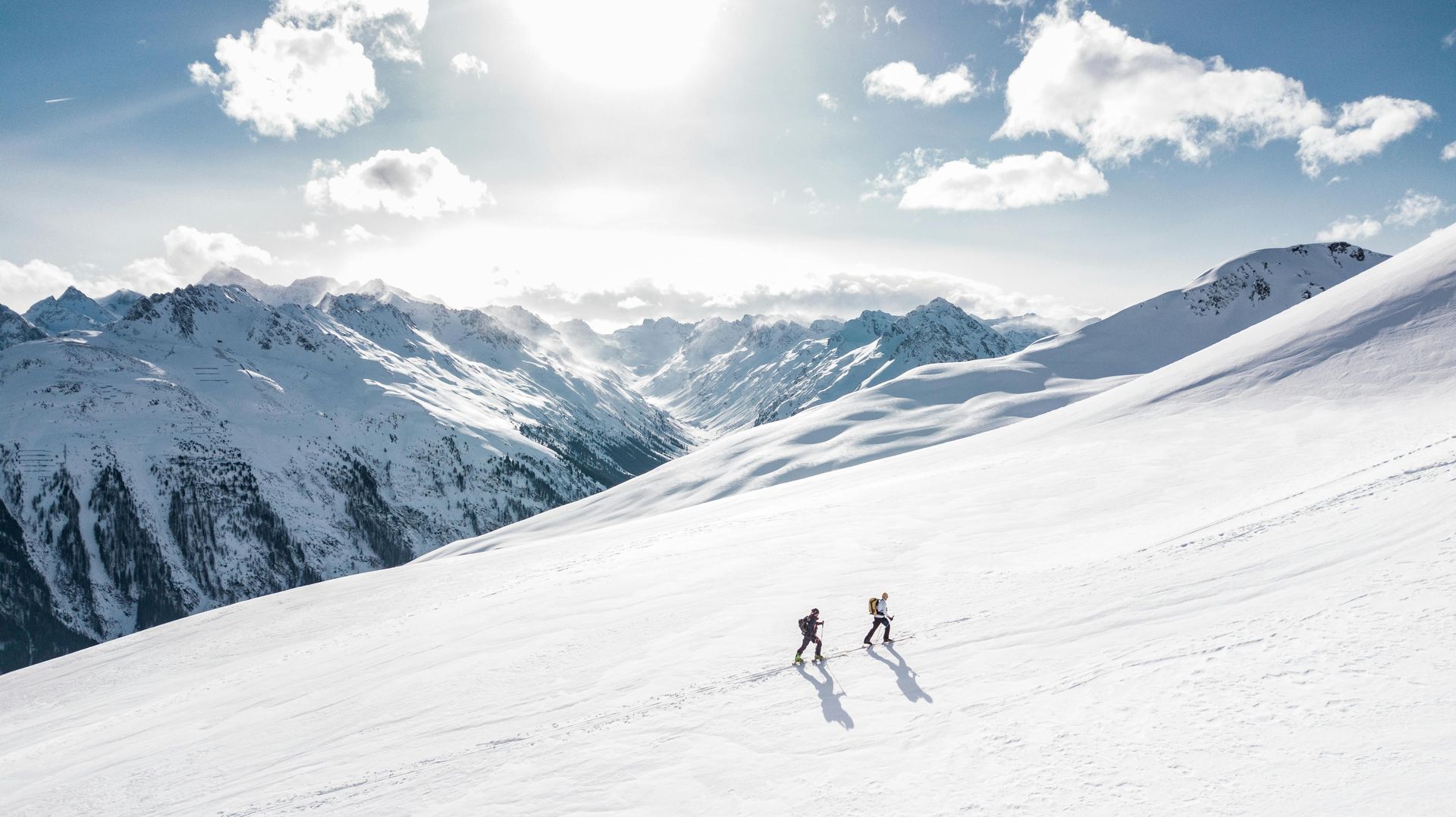
By Charles Phanumphai
•
September 20, 2024
With the school year in full swing and fall around the corner, many families are already shifting their focus to the upcoming 2024-2025 winter ski season and securing the perfect accommodations for their stay in the mountains near Winter Park or Granby Ranch. Whether it's planning the ultimate family vacation or locking in a seasonal rental, parents are taking steps to ensure they have everything lined up in time for the snow.
Business Hours
- Mon - Sun
- Open 24 Hours

